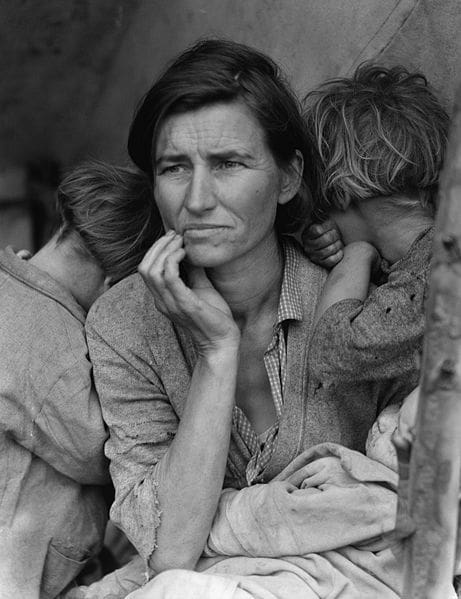The New Normal: Denial
Since the first utterance of the phrase “green shoots,” there have been attempts to gaze into the crystal ball, to predict what things are going to be like once we get out of the recession/depression-lite.
 The most recent is a long Newsweek piece on how the psychological effects of being a young person caught up in the throes of an economic meltdown persist for the rest of your life.
The most recent is a long Newsweek piece on how the psychological effects of being a young person caught up in the throes of an economic meltdown persist for the rest of your life.
On behalf of all us Upper Midwestern kids who came of age during the early 80s, when Reaganomics was strangling the industrial sector to death, and open war was being made upon union jobs that paid livable wages, may I say the following:
No duh, Sherlock.
The behavior changes that are listed: increased saving, cynicism about institutions, depression and alienation from communities — hey, didn’t I useta know you guys by the moniker Generation X?
The Economist has a slightly more intellectual and facts-based analysis, as you might expect. Back in October, they devoted an issue to analyzing whether it’s safe to come out of the bomb shelters yet. Basically, they still rely on the predictable free-market capitalist ideas of the government handing huge sums of cash over to supposedly wise business leaders, who will then generously use said piles o’ cash to create jobs and tax revenues.
Cash-strapped companies are skimping on research and development. Emerging economies are having to rethink their reliance on exports for growth. Both rich and poor governments will be tempted to intervene. They should avoid cosseting specific industries with subsidies or protection. Allowing market signals to work will do more to boost productivity than cack-handed industrial policy.
This rather flies in the face of the behaviors (I almost stuck the veddy British “u” into that last word) of the last 20 years or so, where the whole “Greed is Good” and “Masters of the Universe” memes combined to raise a generation of bankers & industrialists who felt that no luxury was too absurd. $30,000 shower curtains? Sure, hang ’em up! Blowing $400 million of shareholder money to fund your lavish lifestyle? Why not. Running a $50 billion Ponzi scheme that impoverishes just about every decent charity in the Western Hemisphere? Done deal.
So forgive me if I don’t buy into the notion that the same profligate, arrogant pricks that got us into this mess, and who are even now right back at their ugly, reckless behavior — are suddenly going to transform themselves into righteous, community-minded slow&steady engines of economic growth.
Barrons jumped the gun last June, with an article that tried to impose some kind of formula on what a recovery is going to look like. They figured that the biggest threats were higher oil prices, driven by a showdown between Israel and Iran over nukes (still a strong contender), and too much consumer saving driving down demand (mixed on that one). But here’s the nut graf:
What troubles me the most is that people lost faith in things that they really should believe in. This was an unprecedented financial crisis, but it has pretty much calmed down, and now we have a very severe but precedented recession. What disturbs me is the phrase, “It is different this time.”
And there we come to it.
All this analysis, to me, is an outgrowth from our desperate need to believe that what we did in the last 10 years was just a momentary blip, that things are going to go back to some sense of normalcy some time soon. Unfortunately, the things that I saw when I was traveling all over the world in 2006-8, working with some very high level bankers, proved to me that there was, indeed, something different this time around.
This wasn’t just the Thai monetary meltdown of 1997, or the oil price spikes of the 70s.
The real-estate madness was global. Everywhere I went, I heard the same thing: “You think house prices are crazy where you are. Well, HERE they’re REALLY out of whack!” Mexico. Chile. Argentina. Russia. Netherlands. Spain. England.
Everywhere I went, the same thing.
I am coming to believe that the only normalcy that we are going to have (for as long as we are able to keep our petroleum-based house of cards aloft) is that there is going to be constant chaos and upheaval. The big, buried financial instrument of Mass Destruction that Po Bronson so prophetically wrote about a decade ago in “Bombardiers” are going to keep going off, like the deep-buried IEDs that keep killing US soldiers in Afghanistan.
Commercial real-estate. Peak oil. Lack of investment in electrical or transportation infrastructure. Unwillingness to deal with absurd public employee pensions. An unbreakable military-industrial complex that insists on wasting hundreds of billions on weapons systems we don’t need and will never use.
If we are very, very lucky, what this means is that we are finally going to deal with all these problems. Because there simply is no alternative.
Technorati Tags: New Normal, economy, advertising, analysis, greed, The Economist, Newsweek, future, webconomics

